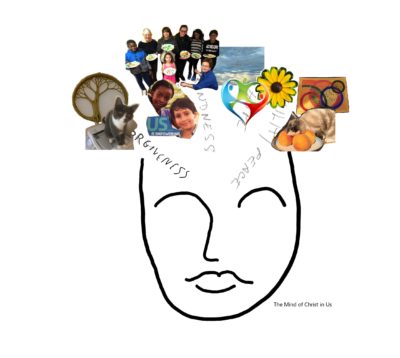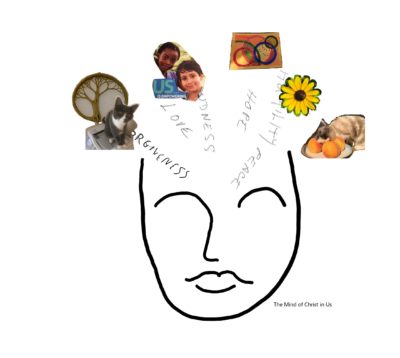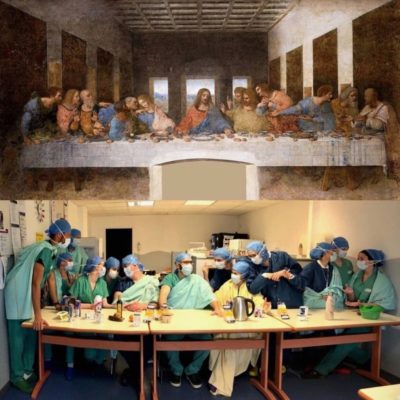Seekers recognizes that any member of the community may be called upon by God to give us the Word, and thus we have an open pulpit with a different preacher each week. Sermons preached at Seekers, as well as sermons preached by Seekers at other churches or events, are posted here, beginning with the most recent.
Click here for an archive of our sermons.
Feel free to use what is helpful from these sermons. We only ask that when substantial portions are abstracted or used in a written work, please credit Seekers Church and the author, and cite the URL.
“The Mind of Christ…In Community” by Elizabeth Gelfeld
 September 20, 2020
September 20, 2020
Sixteenth Sunday after Pentecost
I started coming to Seekers Church in 2008, and made my first commitment probably the following year. I haven’t recommitted every year since then, but most years. And, occasionally, I’ve preached the sermon. I can’t recall a sermon that has been more difficult for me to get a handle on than this one. I have plenty to say, but somehow the message just kept slipping out of my grasp. It might become apparent, in what I say to you this morning, why this was happening.
My focus is on the parable we just heard from Matthew’s gospel, and I’m going to ask three questions:
- What is Jesus saying to us, today, through this parable? Or, as Peter asked in a recent mission group meeting, “What is the Creator putting out there for us to learn?”
- What is the good news, for us, today?
- What does this have to do with commitment to Seekers Church?
I will share some possible answers, and I encourage you also to listen for your own answers, because yours might be different from mine.
“Forgiveness” by Michele Frome

September 13, 2020
Fifteenth Sunday after Pentecost
This morning I am going to focus on the passage for today from Genesis, about Joseph and his brothers. As you may recall, Joseph is the eleventh son of Jacob. Joseph is Jacob’s favorite, and Joseph’s brothers really resent that.
When the brothers get the chance, they kidnap Joseph and sell him into slavery in Egypt. Amazingly, Joseph ends up becoming the second most powerful person in Egypt, after interpreting the Pharaoh’s dream, predicting seven years of plenty followed by seven years of famine. Thanks to Joseph, Egypt stockpiles enough grain during the years of plenty to see them through the years of famine.
When the famine hits, Joseph’s brothers come to Egypt in search of food.
They end up presenting their case to Joseph, but they don’t recognize him.
Joseph eventually reveals himself to them and persuades the whole family to move to Egypt, where Joseph takes care of them.
Today’s reading takes place about 17 years later, when Jacob dies. Now, the brothers fear that Joseph will finally retaliate for what they did to him. But he doesn’t. Instead, he continues to take care of them.
“Commitment as a Compass through Chaos” by Peter Bankson

September 6, 2020
Fourteenth Sunday after Pentecost
It has been a chaotic summer. Avoiding the pandemic has isolated us from each other, giving us more time alone to worry and more pent up energy to react. Rising confrontation over racial injustice has stoked fear and concern. And the acceleration of election campaign combat is souring the media, leaving a bad taste in everyone’s mouth. The tension has infected our lives in many ways. For most of us, this opens the gate to denial, depression, and disconnection.
These ARE the times that try one’s soul. In some cases, though, all this negativity has given us fleeting opportunities for deeper reflection and new action. We have shared some of those deeper reflections in different ways here in Seekers. Several recent sermons went very deep and have been received with open hearts.
This is not the first time that the human species has been in chaos. But so far we have found our way through. Our Hebrew Scripture reading for this week, the story of the beginning of the Passover, is a good example of how a people came together, committed themselves to God and each other, moved into an unknown future and found new stability. I know, none of these journeys of metamorphosis have been perfect. But cultures have survived and continue to grow as we find new ways to center in God.
“The Hounds of Hell” by Sandra Miller

August 30, 2020
Thirteenth Sunday after Pentecost
In K-12 schools of the Onondaga people, every day starts with a prayer of thanksgiving, which begins:
Today we have gathered and when we look upon the faces around us we see that the cycles of life continue. We have been given the duty to live in balance and harmony with each other and all living things. So now let us bring our minds together as one as we give greetings and thanks to each other as People. Now our minds are one.
And I offer this as well: Let us pray that the words of our mouths and the meditations of our hearts be of value to you, Holy One, ground of our being who opens the path to our personal and communal salvation. Amen
Each time I preach, I say to myself afterwards, “that’s the last time.” Yet, sometimes the call is also felt as a need. Each in our various ways must raise our voices in response to the times we find ourselves in, to speak truth to power just as Jesus did. The sermon you are about to hear is not the sermon I had in mind when I said yes to the opportunity, as both the call and the inner need changed, day by day, if not minute by minute.
“The Scariest Line in the Bible” by Deborah Sokolove

August 23, 2020
Twelfth Sunday after Pentecost
Last week, our Hebrew Scripture reading ended with the dramatic reunion between Joseph and the older brothers who had sold him to some passing traders when he was 17. By that time, Joseph had become an important official in the court of the Pharaoh, as the king of Egypt was called. The Pharaoh wisely decided to listen to Joseph’s advice about how to prepare for the coming natural disaster, and put this 30-year-old foreign expert in charge of storing up a lot of grain during the years of plenty so that the people would not starve during the years of drought.
As you may recall, the brothers were there because the famine had spread to the place they were living in Canaan, and the only place to buy grain for themselves and their livestock was in Egypt. Joseph sends his brothers back to Canaan to fetch their father, Jacob, plus nearly 70 members of his family, and all of their livestock and other possessions. Grateful for Joseph’s help, Pharaoh tells this small tribe to settle in a part of Egypt called Goshen, where the family grows and becomes wealthy. Genesis ends with the death of Joseph at the age of 110, after a life filled with riches, honor, and the gratitude of the Pharaoh.
But time passed, and the next book, which we call Exodus, begins with what one of my seminary professors called the scariest line in the entire Bible: “A new Pharaoh—one who did not know Joseph—came to power in Egypt.”

